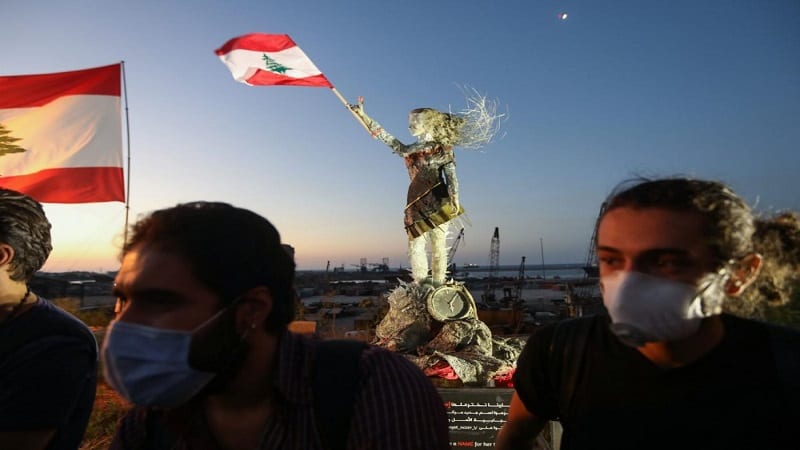Lebanon’s lead investigator into the catastrophic Beirut port explosion charged outgoing premier Hassan Diab and three ex-ministers with negligence, four months after the blast.
They are the first politicians to be indicted over the devastating 4 August blast that killed more than 200 people, disfigured the heart of the capital and stoked a wave of public anger against Lebanon’s ruling elite.
Included among those indicted are former finance minister Ali Hassan Khalil and the ex-ministers of public works Yusef Fenianos and Ghazi Zaiter.
A judicial source on Thursday said the four were charged with “negligence and causing death to hundreds and injuries to thousands more”. The charges represent the first time an official indictment has been levied against a serving prime minister in Lebanon.
Diab, who resigned in the wake of the explosion, responded to the indictment in a statement on Thursday, saying that his “conscience is clear” and that he is “confident of his handling” of the port explosion.
In the week’s following the August blast, it was revealed that top security officials and politicians had known for years about hundreds of tonnes of ammonium nitrate fertiliser stored haphazardly at the Beirut port, but had failed to take precautionary measures.
The decision by Judge Fadi Sawwan came after the investigation confirmed the four had received “several written notices warning them against postponing the disposal of ammonium nitrate fertiliser”, the judicial source said.
“They also did not take the necessary measures to avoid the devastating explosion and its enormous damage,” added the source, who spoke to AFP on condition of anonymity because he was not authorised to speak on the issue.
Diab testified before Sawwan in September.
His office on Thursday said the outgoing premier’s conscience was clear.
“He is confident that his hands are clean and that he has handled the Beirut Port blast file in a responsible and transparent manner,” it said in a statement.
Judge bypasses parliament
The United States in September slapped sanctions on Khalil, the former finance minister, and Fenianos, one of the ex-ministers of public works, for alleged corruption and support of the Hezbollah movement.
In a letter to parliament late last month, Sawwan asked lawmakers to investigate several outgoing and former ministers, including Khalil, Fenianos and Zaiter, over the blast.
The letter came after Sawan’s investigations raised “certain suspicions about the responsibility of those ministers and their failure towards addressing the presence of the ammonium nitrate at the port”.
The judicial source Thursday said parliament had not responded to Sawwan’s request, prompting him to press charges, AFP reported.
Sawwan will begin questioning the suspects on Monday 14 December, the source said.
Diab on Thursday told the judge that he respected the rule of law, but accused the judge of bypassing parliament and said he had already “provided all the information he had regarding this file”.
The investigation has so far led to the arrest of 25 people, including top port and customs officials.
Lebanese officials have rejected an international probe despite demands both at home and abroad for an impartial investigation.
Experts from France and the US Federal Bureau of Investigation took part in the preliminary investigation.
Decades of negligence
Public anger has simmered over the pace of the investigation, which had until Thursday spared top political officials widely accused of being responsible for the country’s worst peace-time disaster.
Lebanese on social media cautiously welcomed the charges but indicated that there was more to be done.
“All this could remain a mere attempt to calm public opinion unless it comes with serious investigations into the responsibility of these and other ministers who have not yet been summoned,” Lebanese rights group Legal Agenda wrote in Arabic on Twitter.
Many blame the blast on decades of negligence and corruption by the country’s ruling elite, who include former warlords from the 1975-1990 civil war.
On 20 July, Diab and President Michel Aoun had both received a report from the state security agency warning of the danger posed by the highly unstable material at the port.
After the explosion, the agency confirmed it had alerted authorities in a detailed report quoting a chemical expert who had visited the warehouse.
If ignited, the ammonium nitrate would cause a huge explosion that would be especially destructive to the port, warned the report, which was seen by AFP.
The Beirut Bar Association has handed the public prosecutor hundreds of criminal complaints from victims of the explosion.
Lebanon is mired in its worst economic crisis in decades, but its divided political class has for months failed to agree on a new cabinet to implement desperately needed reforms.
Saad Hariri, who stepped down as premier last year following mass anti-government protests, is set to make a comeback after he was tasked in October with forming a government.
Source: Middle East Eye






 WhatsApp us
WhatsApp us 

